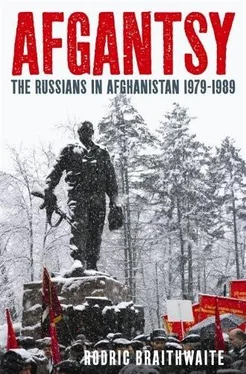But as the nineteenth century advanced, the Russians became increasingly suspicious of the predatory intentions of the British in northern India. British merchants were competing with increasing success in Central Asian markets. British agents were popping up all over Central Asia. All this, the Russians considered, was directly contrary to their own legitimate interests. So they began to prepare more systematically for a renewed move south.
This time there was no question of despatching troops without maps on the basis of rumour. The main agency for conducting relations with Russia’s neighbours in Central Asia and for collecting intelligence about them was the Frontier Commission based in Orenburg in Siberia. From 1825 to 1845 the Commission was headed by General Grigori Fedorovich Gens (1787–1845), a distinguished Orientalist and scholar. In 1834 Gens sent one of his young officers, a naturalised Frenchman called Pierre Desmaisons, disguised as a mullah, to discover what he could about the Emirate of Bukhara. The following year he sent Jan Witkiewicz (1798–1839) on a more substantial mission. Witkiewicz (known in Russian as Ivan Viktorovich Vitkevich) came from Polish Lithuania, then part of the Russian empire. He had been conscripted into the army and exiled to Orenburg at the age of sixteen for participating in an anti-Tsarist underground organisation. A gifted linguist, he was noticed by his superiors, promoted, and appointed to the Frontier Commission.
Unlike Desmaisons, Witkiewicz made no attempt to pretend he was not a Russian officer and travelled in full uniform. He learned to his dismay that a British officer, Alexander Burnes (1805–41), had got to Kabul before him. But he remained there for four months, attempting to negotiate a trade agreement with the Emir Dost Mohamed, and returned to Orenburg with an Afghan emissary carrying a request from the Emir for Russian financial and diplomatic support against British interference in Afghanistan.
The Governor of Orenburg, General Perovski, welcomed the proposal, arguing to his superiors that if the British succeeded in establishing themselves in Kabul ‘it would be only a step for the British to reach Bukhara; Central Asia would be subjected to their influence, our Asian trade would be ruined, they might arm… our Asian neighbours against us, and supply them with powder, weapons and money’. 10The Russian government agreed and sent Witkiewicz back to Kabul bearing gifts, and with secret instructions to collect intelligence. He arrived in Kabul to find that Alexander Burnes had once again beaten him to it. But Burnes’s negotiating position was fatally undermined when the Governor General of India, Lord Auckland (1784–1849), sent an arrogant and ill-judged ultimatum to Dost Mohamed, threatening that if he allied himself with the Russians or anyone else, he would be forcibly deposed.
Not surprisingly, Dost Mohamed received Witkiewicz with every mark of favour. Witkiewicz offered a Russian alliance and a guarantee of Afghanistan’s independence and territorial integrity. But on his return to St Petersburg, the offer was repudiated by the Tsar’s government, perhaps in order not to provoke the British. Witkiewicz committed suicide, and the documents he brought back with him disappeared. The background to this bizarre turn of events has not been satisfactorily explained. 11
By now British spies and agents were moving ever further northwards, penetrating deep into Central Asia, into Bukhara, Khiva, Kokand, places of particular interest to Russia for more than a hundred years. The government in St Petersburg agreed with General Perovski that the valuable trade through Central Asia could only be protected by force of arms.
In 1839, as the First Anglo-Afghan War was getting into its stride, General Petrovski was sent to bring the Khan of Khiva to heel. His force consisted of three battalions of infantry and three regiments of Cossacks, together with twenty guns and ten thousand camels. The force was well supplied and the winter season had been deliberately chosen to avoid the heat of the desert. Unfortunately the winter turned unusually savage, the temperature fell below thirty degrees centigrade, and men and camels melted away. The last remnants of the expedition got back to Orenburg in June 1840.
But the Russians did not give up. Military defeat following the Anglo-French invasion of the Crimea (1853–6) had clipped their wings in Europe, so they turned their energies to the east and the south. In 1854 the Faculty of Oriental Languages was set up at St Petersburg University, marking the beginning of a distinguished tradition of Oriental studies in Russia. Rumours and agents’ reports now told of British plans to advance from Persia or through Afghanistan to the Caspian Sea and beyond. In 1857 Prince Baryatinski, commanding the Russian forces in the Caucasus, warned that ‘the British are preparing in detail for war, and will attack from two directions: from the Persian Gulf in the south and from the east through Afghanistan… The appearance of the British flag on the Caspian Sea would be a mortal blow not only to our influence in the east, not only to our external trade, but to the political independence of the empire.’ Schemes were once again bandied around among Russian officials for an incursion into India; they were not taken up. 12A more sober paper, ‘On the Possibility of Unfriendly Clashes between Russia and England in Central Asia’, by two senior staff officers, sensibly concluded that the British would hardly risk their armies so far from the oceans they commanded. They might, however, seek to inflict political damage through ‘secret intrigues in our Muslim provinces and among the Caucasian mountaineers’ and interfere in the affairs of ‘our neighbouring regions’. The authors went on to reject categorically any idea of an Indian campaign: the flanking route through Herat was too difficult to supply and the direct route through Afghanistan could too easily be fortified against an invading Russian army. For the time being the Russian attitude should be purely defensive. These conclusions, which were in part conditioned by the need not to provoke Britain without good cause in the aftermath of defeat in the Crimean War, were strongly endorsed by the Foreign Minister, Gorchakov. 13
A defensive policy did not exclude—indeed, in the eyes of some soldiers and policymakers it explicitly justified—a further move south for the protection of trade and the exclusion of the British. After 1857 the Russians, and in particular the well-informed Asiatic Department of the Foreign Ministry, stepped up their collection of intelligence on the region through agents, scientific expeditions, and diplomatic missions. One of the most important was led by Nikolai Ignatiev, an ambitious young officer who had been military attaché in London. On his return, he became head of the Asiatic Department. He was on good terms with the hawkish War Minister, Dmitri Milyutin, and like him he believed that Foreign Minister Gorchakov was insufficiently robust in his promotion of Russian interests. His influence in favour of an active Russian policy in the east was to grow substantially over the decades. 14
In the light of all this new intelligence, one confidential analysis after another argued that the British were aiming at establishing control over Central Asia and driving out the Russian trade; and that it was essential for the Russians to pre-empt them. Whether the British ever had any such intention is not so important. The belief affected and distorted policymaking in St Petersburg and Orenburg, just as policy-making in London and Delhi was affected and distorted by the belief that the Russians intended to come through Afghanistan into India. Paranoia affected judgement in all four cities.
And so the Russians concluded that their interests in Central Asia could not be finally secured by diplomacy alone. In the years that followed they annexed or took into their protection all the independent states of Central Asia, city by city: Tashkent in 1865, Samarkand in 1868, Khiva in 1873 and the remaining lands east of the Caspian Sea in 1881–5.
Читать дальше












